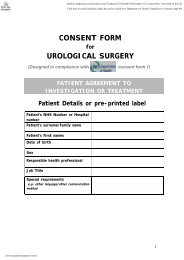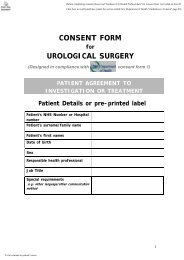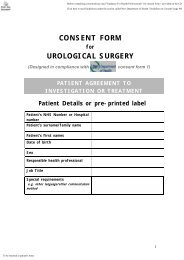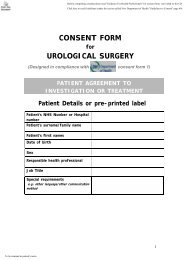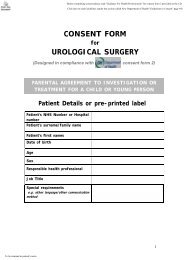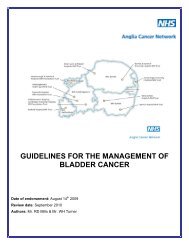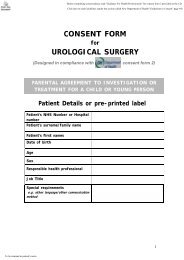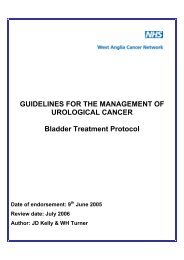parent consent form - Pchurology.co.uk
parent consent form - Pchurology.co.uk
parent consent form - Pchurology.co.uk
You also want an ePaper? Increase the reach of your titles
YUMPU automatically turns print PDFs into web optimized ePapers that Google loves.
About the <strong><strong>co</strong>nsent</strong> <strong>form</strong><br />
Can I find out more about giving <strong><strong>co</strong>nsent</strong>?<br />
The Department of Health leaflet Consent – what you have a right to expect is a<br />
detailed guide on <strong><strong>co</strong>nsent</strong> in versions for adults, children, <strong>parent</strong>s,<br />
carers/relatives and people with learning disabilities. Ask for one from your<br />
clinic or hospital, order one from the NHS Responseline (08701 555 455) or<br />
read it on the web site www.doh.gov.<strong>uk</strong>/<strong><strong>co</strong>nsent</strong>.<br />
Who is treating me?<br />
Amongst the health professionals treating you may be a “doctor in training” –<br />
medically qualified, but now doing more specialist training. They range from<br />
recently qualified doctors to doctors almost ready to be <strong>co</strong>nsultants. They will<br />
only carry out procedures for which they have been appropriately trained.<br />
Someone senior will supervise – either in person ac<strong>co</strong>mpanying a less<br />
experienced doctor in training or available to advise someone more<br />
experienced.<br />
What about anaesthesia?<br />
If your treatment involves general or regional anaesthesia (where more than a<br />
small part of your body is being anaesthetised), you’ll be given general<br />
in<strong>form</strong>ation about it in advance. You’ll also have an opportunity to talk with<br />
the anaesthetist when he or she assesses your state of health shortly before<br />
treatment. Hospitals sometimes have pre-assessment clinics which provide<br />
patients with the chance to discuss things a few weeks earlier.<br />
Will samples be taken?<br />
Some kinds of operation involve removing a part of the body (such as a gall<br />
bladder or a tooth). You would always be told about this in advance. Other<br />
operations may mean taking samples as part of your care. These samples may<br />
be of blood or small sections of tissue, for example of an unexplained lump.<br />
Such samples may be further checked by other health professionals to ensure<br />
the best possible standards. Again, you should be told in advance if samples<br />
are likely to be taken.<br />
Sometimes samples taken during operations may also be used for teaching,<br />
research or public health monitoring in the future interests of all NHS<br />
patients. The NHS trust treating you will have a local system for checking<br />
whether you’re willing for this to happen.<br />
48<br />
Good practice in <strong><strong>co</strong>nsent</strong> implementation guide




